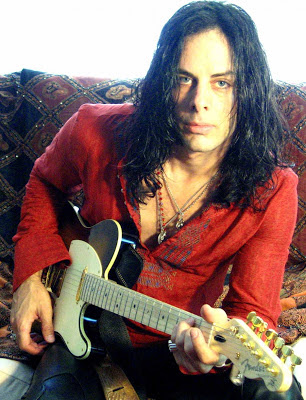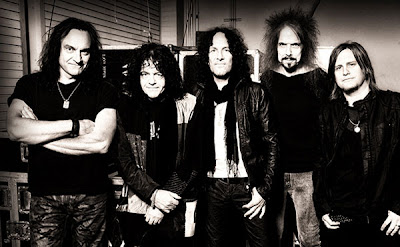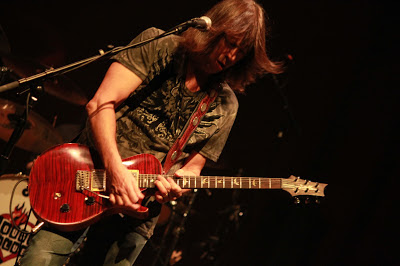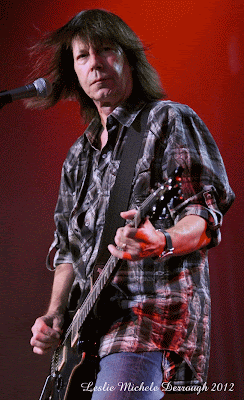65amps founder Dan Boul willingly admits that neuroses and fear were the driving factors in the birth of his company. He's spent over ten years designing radical new concepts in guitar amplification when most high end boutique amp builders are still trying to clone Jim Marshall, Leo Fender, and Dick Denny. He only uses the absolute best components in his amps, and after multiple line evaluations by a few of the best builders in the industry, he then proceeds to burn in his amps for a few days (not hours, days) using a NASA designed program to ensure they will not fail. I've seen his cabinets thrown end over end on to the factory floor to no effect. I've heard them onstage with Cheap Trick (check out their Sgt. Pepper DVD), Sheryl Crow, not forgetting, of course, Elvis Costello using his set up of three Lil' Elvis combos - they've been seen on the Tonight Show, SNL (Jared Scharff has been a user for years), and most of the network shows that feature live music. He also picks up the phone when a customer calls, and maintains a running dialogue with the many thousands of viewers of his weekly podcast. Lunch with Dan Boul of 65amps.
 |
| Elvis Costello's rig - 3 Lil' Elvis' |
He also is responsible for building some of the best sounding, and most robust guitar amps on the planet. Joe Walsh just bought one of Boul's latest creations, The Producer EL, on the eve of an Eagles tour - what does that suggest?
It suggests that he may be driven by things that more modern manufacturers should heed, and that a staunch refusal to compromise may still be the best way to succeed in business.
I could tell you the story, but to be honest, Dan was there every step of the way, and he tells it better - so I'm going to walk away and let him do the talking. This is a transcription of a talk Dan recently gave to the staff at Sweetwater Musical Instruments & Pro Audio. It's constructed about as well as on of his creations from 65amps, but doesn't that just make sense?
Ladies and gentlemen, Dan Boul:
"I started in my back yard in Valley Village, California. Me and my best friend, Peter Stroud, who was the best man at my wedding, and plays guitar for Sheryl Crow - he's the tall, skinny, blonde haired guy that's been with her for about 15 years.
"About 10 years ago, Sheryl came to her whole band and said, 'Look guys, we've got a two and a half hour show now, and I can't really yell over your 100 watt Marshalls anymore.'
"Stage volumes are dropping everywhere and in-ear monitors have become standard, so she kind of put out the edict that she wanted to bring down the stage volume. So we started out looking at every amp we could find, and none of them would really pass muster with Sheryl. Sheryl is actually a music teacher, and a hard core musician - she has a degree in music education. I went to college with her at the University of Missouri. She's a very, very picky artist, and she wanted to retain the sound of the big vintage amps at reasonable volumes, so out of frustration, we made our first amp, it's called the London. It's sort of a blend of two of our favorite EL84 amps."
Dan's Boul and Peter Stroud's Background:
Dan Boul: "I was on the road for almost twelve years playing music for a living. I had gone to GIT in Hollywood back in the '80s when we all had poodle hair.
"I then moved to Atlanta in the later '80s, and if you'll remember, that scene was very happening - there was The Georgia Satellites, Jason & The Scorchers, R.E.M., and lots of other great bands, kind of right before Seattle happened.
"I met Peter Stroud, who is an astonishingly good guitar player, there. We were working at a big music store called Rhythm City. At the time, everybody was getting into what we affectionately called the fuzzy amps - it was all about super high gain, and scooped out tones.
"Everybody was coming in and saying, 'My amp doesn't have a master volume, so it doesn't have a lot of dirt at low volume, so I want to get a JCM800.' We'd go, 'Really? That's a 1969 100 watt Plexi you're wanting to get rid of.'
"I had a Vox AC30 at the time, and at that time an AC30 was a practice amp. So, guys were giving away all their vintage amps and trading them in - we got a bunch of great amps, and we learned how to modify them.
A Seed is Planted:
Dan Boul: "One of the things we learned, Peter's been playing for a living since 1978, I started in the ninth grade, and you start learning about what goes wrong with amplifiers. Every major brand of amplifiers, God bless 'em, have distinct faults.
"I've spent too many times in between sets in the middle of Somewhere, Alabama working on amps after they had blown grid resistors and popped fuses, and you just start learning their weaknesses.
"So, Peter and I have been doing this since about 1988 - when Sheryl came along and said, 'Listen, you've got to change the whole stage,' we were frustrated - we just sat down and decided to make an amp."
 |
| 65amps London |
How Fear Can Be Used To One's Advantage:
Dan Boul: "So I was terrified - we overbuilt the amp as much as we possibly could!
"I'd love to tell you that I'm a brilliant engineer, and I had all this foresight. No. It's because I was terrified. I'm going to be straight up honest - I was scared that something would go wrong.
"So, every little flaw that we new about, all those classic amps have their flaws, and we tried to design them out. There's about 25 decisions we've made inside the chassis to get rid of these issues.
"The goal was this - Peter was out at the time, and he had a plexi, a blackface Super, and a couple of little Valco amps, and we wanted to build one box that would throw a wide enough net and do them all. All of our amps have at least two distinct voices - The Producer, our latest amp, has four.
"It had to be ridiculously roadworthy, ridiculously reliable, and very easy to service - because if anyone has played for a living, you've sat backstage in the dark with a flashlight in your mouth trying to fix something, while the drummer's going, 'C'mon, dude, let's go."
'That's a terrifying experience, so we wanted to make them easy to work on, and easy to fix.
"Peter took the first amp to rehearsal, and Sheryl said, 'I love it, it's great, can I get one?'
"We went, 'What?' At the time, I was an IT project manager, and Peter was definitely not in the amp business. So, I had to make another one, and then Tim Smith, the other guitar player in the band wanted one, so we ended up building a few amps in the little pool house behind my home - they went out on tour, and I at Blue Shield of California."
The Pros Call and a Company is Born:
"I'm at my office, I'm wearing my headset, and I'm getting calls from Peter Frampton, Joe Walsh, Steve Miller, and they're all going, 'Hey, I just went and saw a Sheryl Crow show, and I was backstage talking to Peter, and he said you'd build me one of these amps.'
"Guys like that I'd admired all my life, so what was I going to say?
"So, we started making amps, and one thing led to another, and here we are in business.
"I was made in '65, Peter was born in another year, so we tossed a coin and it ended up being 65amps. That was our joke name until we could come up with something real. I have a weird '60s connection - I really grew up mostly in the '70s in Missouri, so everything from the '60s was still hip! It wasn't exactly a progressive place.
"My first car was a '67 Mustang, recognize the tail lights?
"My favorite '60s car was the split window Corvette, recognize this front?
"And, when I was a little kid, I adored Speed Racer, recognize the logo?
"We weren't planning on going into business, we were just going to make a few amps for some pros, and it caught on - so I'm kind of here by accident.
A New Approach:
Dan Boul: "We're a unique company - started by a couple of guitar players, not by techs.
"I'm not a brilliant engineer, I'm a cocktail napkin engineer, and a neurotic learner. I can sit down and figure things out. I've got scars from electrocuting and burning myself hundreds of times, but what we do differently than most companies is we surround ourselves with a lot of incredibly smart people.
"We're in Los Angeles, which is kind of the belly of the beast. That's where Howard Dumble started, where Matchless started, so there's a great pool of bright guys that we can call upon. So, if we have an idea, it's easy to flesh out - I can build a prototype and then go to the smart guys, and they make sure it's right.
"That's how we got started, out of a direct need for some lower powered stuff that works correctly."
Approach to a Build:
Dan Boul: "Let me talk a little bit about our construction, because these are expensive amps and I completely respect that for a lot of guys, this is a couple of months salary - so this is an educated sale to make.
"This must be an educated conversation. I can talk about this ad nauseum, it's like talking about my children. I love these things!
"My level of analysis is a bit neurotic.
"Starting off, we use what we consider to be the best examples of amplifiers ever made, and there are some construction techniques that were used that really made a difference.
"I'll start with the cabinets. They're all made out of furniture grade, Grade A Russian Baltic birch - why does that matter, and why should anyone care?
"First of all, it doesn't have knots, or voids in it, so it resonates like a drum shell. And all the joinery on these cabinets are made with either finger joints, or half blind dovetail joints (used when a craftsman does not wish end grain to be visible from the front of the item). We started off doing that because that's what the best Vox cabs were, and those basket weave Marshall cabinets that are still around, those were all finger jointed. The reason those cabs are so valuable is because they were built rugged, they sound fantastic, of course, but with that sort of construction, they last.
"For any of you who have actually went out on the road, how many times have your amps fallen off the back of a truck, or a stage?
"These cabinets are not just boxes with speakers hanging in them - they are actually resonating devices, so we use really high grade woods, and there's some video on the web of me going through our new shop in South LA, and you can see the stacks of Russian birch. That's a proper selling point for these things."
What's Inside a 65?:
Dan Boul: "Then you get into the chassis. The actual piece of metal that the amp sits in is aircraft grade aluminum. We don't just do this for posterity, so you can say you have a fancy chassis!
"It's because it shields and grounds better than any other material we could use.
"The old amps were fantastic, but we really don't copy them - we may model some behaviors. When Jim Marshall, Leo Fender, and Tom Jennings were designing amps, there was not a room full of cell phones, not a room full of wireless mics, nor all of the other RF networks everywhere.
"RF is an important issue if you're out playing on the road. Also, there is grounding and shielding - I remember reading an article a long time ago that stated Jimi Hendrix only liked to play aluminum chassis Marshalls. So the early Marshall chassis were aluminum - when they got to a larger production, they went to steel to save money.
"We did a blind test, and sure enough, you could hear it! It's a subtle difference, but you can hear it. There's a lot of aircraft manufacturing in LA, so it's easy to get aircraft grade aluminum. It's really tough - it's not the kind that bends easily, so you've got the ruggedness of steel, but you have the grounding and shielding ability of aluminum, which is a lot nicer."
 |
| Dan Boul and Earl Slick |
And the Components?:
Dan Boul: "Every component is our amps were chosen, again, out of fear!
"One of the large amp companies amps have a flaw. When their power tubes fail, they blow grid resistors, and it sends fatal voltage down the entire amplifier. I did that a lot with one of my old amps, and I had an engineer say to me, 'Well, instead of putting that little concrete resistor in the amp, why don't you take a wire wound silicone coated crazy one and put it in there, so if the amp blows, then the resistor doesn't go out.' I said, 'Oh, that's gotta be crazy, what'll that cost?'
"He said, 'About three dollars.' OK, I'll do that.
"Everything that a human touches on these amps are overrated, besides the tubes, tubes are going to go - they are what they are. You'll notice that the power switch is a lot bigger than the standby switch.
"If I'm going to get legal, and get CE and UL, and all these things, I have to put a 400V switch on there - I have 1,000V military sealed switches. Because these are things that are going to break. Somebody's going to be doing a big show, his power switch is going to break, and he's going to call me at home and say, 'Hey man, we're onstage at wherever, and my amp's blown up.'
"Inside the amp, we try to do everything American that we can - I'd say the amp is 90% US, except for the Russian wood, and the speakers, which are from the UK. Everything in the amp is chosen for performance, and there's a lot of cool decisions that we've made.
"This is great, because when you're on the phone with people, they're going to say, 'Yeah, but it's $3500 for a Producer, why am I going to buy that?'
"There is actually a value proposition to what we're doing - the amps have a lifetime warranty on everything except the tubes, and the speakers. I guarantee you that this chassis is going to last longer than you, and you're young!
"The capacitors, the resistors - everything in here is really high performing, high grade stuff. The coupling capacitors are made by a company named SoZo, and they are an approximation of the old mustard caps that all the old Marshalls used, and they're hand finished and made in Connecticut.
"The electrolytic caps that we use are kind of like batteries inside the amp. When you play a big chord, what you're really doing is asking for a lot of electricity, and there are a lot of electrolytic caps in there that are storage spots for electricity. We use what are known as low ESR electrolytics - they charge and re-charge about 3 to 4 times faster than normal capacitors.
"What that means is dynamic range. You hit the guitar, and you're asking the guitar for a lot of voltage, a lot of current, and very quickly those capacitors charge and re-charge very fast - so, as a player, you can feel it. You start feeling like the amp is doing what you are asking it to do. You don't have to work within it's boundaries.
"At the time we started doing that, I didn't know of any other companies that used low ESR caps. Low ESR is just the resistance to the current that's coming in there. As far as I know, that's pretty unique, and those caps cost a lot of money. They are all 1% tolerance, as well."
1% Tolerance, that sounds biased:
Dan Boul: "Most of our amps are cathode biased - and I did that on purpose for the same reason I was talking about earlier, so many times I was backstage, and I'd put in a spare tube, and the bias wouldn't hold because the tubes were so dramatically different. A cathode biased circuit will automatically balance the two tubes.
"I actually used to cathode bias all of my old Marshalls for the same reason. I could pop a tube, put almost anything in there, and it would still work pretty well.
"Cathode bias is a lot more harmonically rich - you get a lot better performance out of the tube. What you don't get is high output - people go to grid bias to get more volume. In the '60s and '70s it was all about getting more efficiency out of the amps. Cathode bias is more musical. It sounds better, and it's easier to service.
"Some of the other components that are in there, such as the resistors, are made by a company called Vishay-Dale. They're mostly used in hi-fi stuff. They are extremely musical, but they are also 1% tolerance.
"99% of the amps in the world, even boutique amps, are made with 5-10% tolerance resistors. So, as your signal is going down 20 different resistors, a 10% swing, which means a 100K resistor could be anywhere from 90-110K and still be considered good. Well, it's pretty hard to make consistent amps like that. We go with a 1% tolerance which is again a pretty expensive component, so they can stay exactly the same.
"In the tone path, we use what is called an Allen Bradley Carbon Comp, and this is the holy grail resistor, which is one of the secret solaces for all the great vintage amps. Everything made in the USA back in the day used Allen Bradleys, and they are really, really musical. They were in McIntosh hi-fis, as well as Fenders.
"They were just the best sounding resistors in the world - they've been out of production for about twenty years. We were lucky enough, I bought a store of these resistors from an Air Force base in New Mexico, so they've been stored in a dry, temperature controlled environment. I have enough to make amps for decades. Whatever the guitar signal is going through, it's going to be Allen Bradley resistors. I have enough to build about 70,000 amps!"
 |
| Earl's so cool he gets two pics! |
The Producer and the High Current/Low Voltage Revolution:
Dan Boul: "The Producer is the first amp that we've done that is high current/low voltage.
"You have to understand about tubes - they hate voltage, and love current. Voltage is the pressure on the electricity - Current is just the amount of electricity.
"Every amp since the late '50s has been high voltage/low current - for a couple of reasons. It makes them louder, and it's cheaper to build. Putting voltage on the electricity is much less expensive than creating electricity - so, as guys wanted louder and louder amps, they just kept increasing the voltage. If you know Marshalls, they start out at about 390 volts and go up to about 550 volts.
"Well, modern tubes are getting worse and worse with every passing year, and I kind of keep track of it at the shop. It's not a cliff, but they're degrading every year. I go into Excel and forecast that out 5 to 10 years, and you can see that most amp designs aren't going to be functional with modern tubes, especially vintage amps. If you've got a vintage 100W Plexi, there's not many modern tubes that you can put in that amp without going to mush after 20-30 hours.
"So - voltage and current have a reciprocal relationship. This is the techie part, sorry.
"If you want to get the same behavior out of a tube, if you drop the voltage, you have to raise the current. It's a teeter totter, there's no forgiveness there - it's the laws of physics. Mr. Newton was one of the guys that laid that out. This isn't theory, it's a fact.
"I've seen a lot of amps that they've dropped the voltage on to make the tubes last, but they didn't raise the current. There are no transformers in the world that I could find that would give me the current I needed to drop the voltage.
"I went to Mercury Magnetics in Chatsworth, California, and Sergio Hamernik is the insane genius there - I told him what I wanted to do, and he said it was going to be a bit expensive because I'd need a transformer about as big as my head to create all this electricity.
"So, what I had was a pair of 6L6s that were just bathing in rich AC, they're really happy, but the voltage on this amp is about 290 volts. And if you know amplifiers, that's pretty unheard of. That's getting down into hi-fi range.
"If you took a normal guitar amplifier, and dropped the voltage that much without increasing the current, it kind of turns into a fuzz box.
"You would expect a good clean sound out of 6L6s - the surprise is that you don't expect great distortion, but it's fantastic. The tubes are really responsive, and even when the amp's been on for an hour, if you want to feel how hot it is, you could touch the tubes - you can't grab them, but you can touch them, and if you've ever done that, you'll generally get a 2nd degree burn from most amps.
"It's a 28 watt amp, but you have the authority and feel of a big amp because these tubes are really, really happy.
"That's the techie part, but for a customer that means that these tubes will probably last 10-20 years!
"Now, in my experience, you're only going to get full performance out of tubes for maybe 150 hours. If you're putting old black plate RCAs in a traditional amp, you'd expect to maybe get 500 hours at top performance.
"We've had The Producer out for a year and a half, and this is a statement I'm incredibly proud of - we haven't blown one tube.
"I've never put out any amp where we didn't have tube failures. So, again - tubes hate voltage, but love current. These tubes are flooded with current, they're very happy, and they will do anything you ask of them. Even at 28 watts, it's pretty loud."
What is Master Voltage, and Why is it Better than Master Volume?:
Dan Boul: "The Master Voltage is something we came up with because Peter was always playing on television shows, and also, Peter lives in Atlanta, and a lot of my old friends down there are playing in churches now.
"I don't know if any of you have ever been in a TV studio, but like The Tonight Show is not a big room, and they have choir mics hanging up over the audience because they want to hear you laugh. So, the bands have to keep it down around 100 dB, and a hand clap is about 85 dB.
"So they just can't push it, so most guys have to rely on a distortion pedal, or master volume, which are great, but you lose your clean sound, you lose your dynamics, all sorts of things.
"We found this circuit, again, I'd love to say I invented it, but I didn't - it's an old hi-fi trick. We're using a mosfet to regulate the voltage coming into the amp, but it lets the current rise. I can drop the voltage down to 175 volts, but I'm letting the current go through, and it really doesn't sound any different.
"If any of you play in a church, or a hot room, you can take the Master Voltage down to about two, and still have a clean sound."
What's the Bottom Line?:
Dan Boul: "It's a value proposition.
"I have this conversation at my shop about 3 or 4 times a week. 'Hey man, I bought this amp for $1800, that amp for about $2400, I bought this one for $1800, that one for about $1700. Why am I going to pay that kind of money for a 65?'
"My usual answer is, 'Hey man, I think you've already spend 10 grand. And you're not happy. The depreciation you've taken on all those amps will pay for one of these.
"It's a smart move to buy an expensive amp. If you need one, and you can buy one of these without taking away from your wife and kids, then it's a pretty smart move - because it might be the last amp you buy for a while.
"It's a lot of money, it's a fair concern, and it's out of respect for that concern that I need to address that concern.
" I have master builders - I don't have kids making $10 an hour soldering stuff up. My head builder used to build cockpits for Raytheon, missile systems in El Segundo. He just happens to be a tube amp freak, thank goodness.
"We have about 3,500 amps in the field, right now, and I only know of one that has failed.
"So, yes sir, it is a lot of money, but in my humble opinion, I think it's money well spent."
 |
| Arne Kr, Hast, Peter Stroud, Tony C, and Dan Boul at NAMM 2013 |
http://www.65amps.com
Thanks to Dan Boul, 65amps, and Sweetwater Musical Instruments & Pro Audio.
http://www.sweetwater.com














































